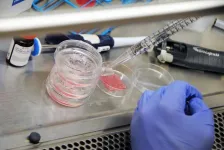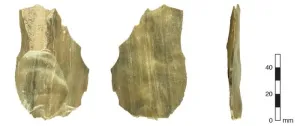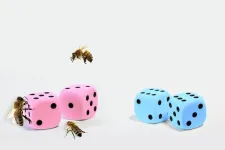(Press-News.org) What if a vaccine, given to patients just before or after arriving at the hospital, could protect them against lethal superbugs that lurk in healthcare settings?
That’s the premise behind an experimental vaccine invented by a USC-led team and patented by the university. Researchers designed the formula to prevent serious infections from drug-resistant pathogens. A new study shows that a single dose, administered in mouse models, put immune cells into "Incredible Hulk" mode, providing rapid protection against eight different bacteria and fungi species.
“It’s an early warning system. It’s like Homeland Security putting out a terror alert. ‘Everybody, keep your eyes open. Keep an eye out for suspicious packages’,” said senior author Brad Spellberg, chief medical officer at the USC-affiliated Los Angeles General Medical Center (formerly LAC+USC) “You’re alerting the soldiers and tanks of your immune system. The vaccine activates them. ‘Oh my, there’s danger here. I better turn into the Hulk.’ I mean, when you have bad superbugs lurking, that’s when you want the Hulk waiting to pounce rather than Dr. Banner, right?”
The study appears October 4 in Science Translational Medicine.
The USC Stevens Center for Innovation, the technology licensing office for USC, successfully filed one patent for the vaccine and is pursuing others. The National Institute of Allergy and Infectious Diseases, part of the National Institutes of Health, gave the researchers' startup, ExBaq LLC, nearly $1 million in the form of a small business grant, aimed at speeding up solutions to high-priority problems.
“The pandemic stimulated unprecedented innovation in vaccine development, where federal funding and university-industry partnerships were game changers for translating promising discoveries from academic labs for the good of all,” said Ishwar K. Puri, senior vice president of research and innovation at USC. “We are both pleased and proud of the critical support the USC Stevens Center provided to enable the development of ExBaq’s experimental vaccine that protects vulnerable populations from serious infections.”
Every year, healthcare acquired infections kill more than 90,000 people in the United States and rack up healthcare costs between $28 billion and $45 billion. On any given day, about 1 in 31 hospital patients has at least one such infection, according to the Centers for Disease Control and Prevention.
In many cases, infections are caused by so-called superbugs such as MRSA — short for methicillin-resistant Staphylococcus aureas —or Acinetobacter baumannii. The infections spread via contaminated surfaces or equipment, such as catheters or ventilators, or though person-to-person spread, often from contaminated hands. Risk is highest among ICU patientswho may suffer surgical site infections, bloodstream infections, urinary tract infections and ventilator-associated pneumonia.
Typical vaccines usually prompt the body to make antibodies against a specific pathogen. Despite the high incidence of healthcare-acquired infections, there are currently no FDA-approved vaccines that prevent the most serious, antibiotic-resistant nfections.
“Even if there were such vaccines, multiple vaccines would have to be deployed simultaneously to protect against the full slate of antibiotic-resistant microbes that cause healthcare-acquired infections,” said Brian Luna, Assistant Professor of Molecular Microbiology and Immunology at Keck School of Medicine of USC.
The experimental vaccine takes an entirely different approach: It gooses the body’s preexisting supply of pathogen-gobbling immune cells called macrophages, which engulf and digest bacteria, fungi and other bad actors. These activated fighters, found in all tissues, quickly neutralize incoming invaders which might otherwise multiply rapidly and overwhelm the body’s defenses.
“This is very different from developing new antibiotics,” said Jun Yan, a PhD student at Keck School of Medicine of USC and the study’s first author. “This is using our own immune system to fight against different superbugs, which is a different approach than everybody else.”
The vaccine is comprised of just three ingredients, two of which are already used in FDA-approved vaccines. A third component is a tiny piece from the surface of a fungus commonly found on human skin.
Tested in two independent labs, the vaccine works within 24 hours and lasts for up to 28 days. In lab models, the number of pathogen-eating immune cells in the blood increased dramatically, and survival time of invasive blood and lung infections improved. Early data suggest that a second dose could extend the window to prevent infection.
To develop the vaccine, Spellberg, Luna, Yan and Travis Nielsen, who earned his PhD in the Keck School of Medicine’s biomedical and biological sciences program before going to medical school, formed the startup ExBaq LLC.
ExBaq's founders have begun talking with potential pharmaceutical partners who might be interested in further developing the vaccine for human clinical trials.
The next step is getting guidance from the FDA on the requirements to complete preclinical studies and submit and Investigational New Drug Application (IND) in 2024. The first such trial would be done in healthy volunteers to find the right dose of vaccine that is safe and triggers the same kind of immune response in people as seen in the mice.
In addition to Yan, Luna, Spellberg and Nielsen, other authors of the paper are Peggy Lu, Yuli Talyansky, Matt Slarve and Hernan Reza, all of the Department of Molecular Microbiology and Immunology at the Keck School of Medicine of USC; Boris Novakovic of University of Melbourne; Mihai Netea of Radboud University; and Ashley Keller, Troy Warren, Antonio DiGiandomenico and Bret Sellman, all of AstraZeneca.
# # #
The study was supported by grants from the National Institute of Allergy and Infectious Diseases at the National Institutes of Health (R01 AI130060, R42 STTR AI106375, R01 AI139052 and 5P30 AI028697).
# # #
END
Hospital superbugs: Could one vaccine rule them all?
MRSA, other antibiotic-resistant infections could be thwarted by experimental shot, a mouse study shows
2023-10-04
ELSE PRESS RELEASES FROM THIS DATE:
New wound healing research by Wake Forest Institute for Regenerative Medicine produces full thickness human bioprinted skin
2023-10-04
WINSTON-SALEM, NC – October 4, 2023 - A research paper published today in Science Translational Medicine presents a significant breakthrough in the area of skin regeneration and wound healing by researchers at the Wake Forest Institute for Regenerative Medicine (WFIRM). The study, titled "Bioprinted Skin with Multiple Cell Types Promotes Skin Regeneration, Vascularization, and Epidermal Rete Ridge Formation in Full-Thickness Wounds," shows the successful development of bioprinted skin that ...
Analysis of grinding tools reveals plant, pigment and bone processing in Neolithic Northern Saudi Arabia
2023-10-04
In recent years, studies have revealed that the now-arid region of northern Arabia was once much wetter and greener, providing Neolithic human populations with access to both water and game. The present aridity of the region, however, preserves little organic matter, making a reconstruction of the Neolithic lifestyle difficult.
Now, in a new study published in the journal PLOS ONE, researchers from the Max Planck Institute of Geoanthropology, the National Research Council of Italy, Institute of Heritage Science (CNR ISPC), and University College London present use-wear ...
Early human migrants followed lush corridor-route out of Africa
2023-10-04
An international team of scientists has found early human migrants left Africa for Eurasia, across the Sinai peninsula and on through Jordan, over 80-thousand years ago.
Researchers from the University of Southampton (UK) and Shantou University (China), together with colleagues in Jordan, Australia and the Czech Republic(1), have proved there was a “well-watered corridor” which funnelled hunter-gatherers through The Levant towards western Asia and northern Arabia via Jordan.
Their findings, published in the journal Science Advances, support previous research conducted ...
A UCLA-led team may have found the key to stimulating human brown adipose tissue into combating obesity
2023-10-04
EMBARGOED FOR USE UNTIL:
2 p.m. (ET) on Oct. 4, 2023
--
A UCLA-led team of researchers has found nerve pathways that supply brown adipose tissue (BAT), a type of tissue that releases chemical energy from fat metabolism as heat – a finding that could pave the way toward using it to treat obesity and related metabolic conditions.
The researchers have for the first time detailed this nerve supply and provided examples of how manipulating it can change BAT activity, marking a first step toward understanding how to use it therapeutically, said ...
Proteins roll the dice to determine bee sex
2023-10-04
To date it has been unclear exactly how the sex of a bee is determined. A research team from Heinrich Heine University Düsseldorf (HHU) comprising biologists and chemists has now identified a key gene and the molecular mechanism linked with it. In the current issue of the scientific journal Science Advances, they describe how this process is similar to a game involving two dice.
The sex of a living creature has significant consequences for its form, function and behaviour. The biological sex of an organism is usually determined at the start of its life. In humans, for example, the presence of the sex-determining “Y chromosome” ...
DOE’s Office of Science Graduate Student Research (SCGSR) Program selects 60 outstanding U.S. graduate students
2023-10-04
WASHINGTON, DC – The Department of Energy’s (DOE’s) Office of Science has selected 60 graduate students representing 26 states for the Office of Science Graduate Student Research (SCGSR) program’s 2023 Solicitation 1 cycle. Through world-class training and access to state-of-the-art facilities and resources at DOE National Laboratories, SCGSR prepares graduate students to enter jobs of critical importance to the DOE mission and secures our national position at the forefront of discovery and innovation.
“This ...
Brain & Behavior Research Foundation names Special Olympics International Recipient of 2023 Pardes Humanitarian Prize in Mental Health and awards Honorary Pardes Prize to Henry Jarecki, M.D
2023-10-04
NEW YORK (October 4, 2023) -- The Brain & Behavior Research Foundation today announced that Special Olympics International is the recipient of the 2023 Pardes Humanitarian Prize in Mental Health. It is recognized for its lasting humanitarian impact around the world through sports training and athletic competition for adults and children with intellectual disabilities.
An Honorary Pardes Prize Recipient was also announced for 2023 – Henry Jarecki, M.D – for his important contributions to the field of psychiatry and his unique work to preserve academic and scientific freedom.
“Special Olympics International is being honored as a beacon of light ...
Mayo Clinic researchers develop calculation to identify high-risk moderate aortic stenosis patients
2023-10-04
ROCHESTER, Minn. — Mayo Clinic researchers have developed a calculation that can help identify moderate aortic stenosis patients at higher risk of dying from the condition. According to new research published in Mayo Clinic Proceedings, calculating the patient's mean arterial pressure (AugMAP) is a simple and effective way to identify those patients who may benefit from more aggressive treatment strategies.
"Physiologically, AugMAP can be considered a marker of global left ventricular contractile function," says Chieh-Ju Chao, M.D., senior associate consultant in the Mayo Clinic Department ...
Machine learning used to probe the building blocks of shapes
2023-10-04
Applying machine learning to find the properties of atomic pieces of geometry shows how AI has the power to accelerate discoveries in maths.
Mathematicians from Imperial College London and the University of Nottingham have, for the first time, used machine learning to expand and accelerate work identifying ‘atomic shapes’ that form the basic pieces of geometry in higher dimensions. Their findings have been published in Nature Communications.
The way they used artificial intelligence, in the form of machine learning, could transform how maths is done, say the authors. Dr Alexander Kasprzyk from ...
Invertebrate biodiversity is improving in England’s rivers, long-term trends show
2023-10-04
Rivers across England have seen a significant improvement in river invertebrate biodiversity since 1989, shows a study led by UK Centre for Ecology & Hydrology (UKCEH) researchers.
The study, which involved one of the largest and most wide-ranging analyses of long-term monitoring data in the world – spanning over 30 years, found improvements in invertebrate biodiversity across all regions and river types in England.
This improvement is all the more surprising given English rivers are amongst the most highly exposed to wastewater and other pressures in Europe. The recent State of Nature report shows that the overall abundance of species in Great ...
LAST 30 PRESS RELEASES:
Researchers develop new strategy for improving inverted perovskite solar cells
Yes! The role of YAP and CTGF as potential therapeutic targets for preventing severe liver disease
Pancreatic cancer may begin hiding from the immune system earlier than we thought
Robotic wing inspired by nature delivers leap in underwater stability
A clinical reveals that aniridia causes a progressive loss of corneal sensitivity
Fossil amber reveals the secret lives of Cretaceous ants
Predicting extreme rainfall through novel spatial modeling
The Lancet: First-ever in-utero stem cell therapy for fetal spina bifida repair is safe, study finds
Nanoplastics can interact with Salmonella to affect food safety, study shows
Eric Moore, M.D., elected to Mayo Clinic Board of Trustees
NYU named “research powerhouse” in new analysis
New polymer materials may offer breakthrough solution for hard-to-remove PFAS in water
Biochar can either curb or boost greenhouse gas emissions depending on soil conditions, new study finds
Nanobiochar emerges as a next generation solution for cleaner water, healthier soils, and resilient ecosystems
Study finds more parents saying ‘No’ to vitamin K, putting babies’ brains at risk
Scientists develop new gut health measure that tracks disease
Rice gene discovery could cut fertiliser use while protecting yields
Jumping ‘DNA parasites’ linked to early stages of tumour formation
Ultra-sensitive CAR T cells provide potential strategy to treat solid tumors
Early Neanderthal-Human interbreeding was strongly sex biased
North American bird declines are widespread and accelerating in agricultural hotspots
Researchers recommend strategies for improved genetic privacy legislation
How birds achieve sweet success
More sensitive cell therapy may be a HIT against solid cancers
Scientists map how aging reshapes cells across the entire mammalian body
Hotspots of accelerated bird decline linked to agricultural activity
How ancient attraction shaped the human genome
NJIT faculty named Senior Members of the National Academy of Inventors
App aids substance use recovery in vulnerable populations
College students nationwide received lifesaving education on sudden cardiac death
[Press-News.org] Hospital superbugs: Could one vaccine rule them all?MRSA, other antibiotic-resistant infections could be thwarted by experimental shot, a mouse study shows





